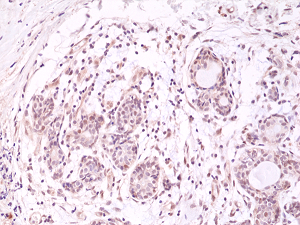anti-AKT (PH domain) (human) Rabbit Monoclonal (RM316)
Product Code:
REV-31-1202-00
REV-31-1202-00
Antibody Isotype:
Rabbit IgG
Rabbit IgG
Antibody Clonality:
Recombinant Antibody
Recombinant Antibody
Antibody Clone:
RM316
RM316
Regulatory Status:
RUO
RUO
Target Species:
Human
Human
Applications:
- Immunohistochemistry (IHC)
- Western Blot (WB)
Shipping:
Blue Ice
Blue Ice
Storage:
+4°C
+4°C
No additional charges, what you see is what you pay! *
| Code | Size | Price |
|---|
| REV-31-1202-00-R100 | 100 ul | £455.00 |
Quantity:
Prices exclude any Taxes / VAT
Stay in control of your spending. These prices have no additional charges, not even shipping!
* Rare exceptions are clearly labelled (only 0.14% of items!).
* Rare exceptions are clearly labelled (only 0.14% of items!).
Multibuy discounts available! Contact us to find what you can save.
This product comes from: Switzerland.
Typical lead time: 14-21 working days.
Contact us for more accurate information.
Typical lead time: 14-21 working days.
Contact us for more accurate information.
- Further Information
- Documents
- Show All
Further Information
Alternate Names/Synonyms:
PKB; AKT1; PKB alpha; EC=2.7.11.1; RAC-PK-alpha; Protein Kinase B; Proto-Oncogene c-Akt; Protein Kinase B alpha; PKBG; AKT3; STK-2; PKB gamma; RAC-PK-gamma; Protein Kinase Akt-3; Protein Kinase B gamma; AKT2; PKB beta; RAC-PK-beta; Protein
Concentration:
N/A
EClass:
32160000
Form (Short):
liquid
Formulation:
Liquid. 50% Glycerol/PBS with 1% BSA and 0.09% sodium azide.
Handling Advice:
Avoid freeze/thaw cycles.
Immunogen:
A peptide corresponding to the PH domain of human AKT.
Long Description:
Recombinant Antibody. This antibody reacts to human AKT (PH domain). It may also react to mouse or rat AKT, as predicted by immunogen homology. Applications: WB, IHC. Source: Rabbit. Liquid. 50% Glycerol/PBS with 1% BSA and 0.09% sodium azide. Akt, also referred to as PKB or Rac, plays a critical role in controlling survival and apoptosis. This protein kinase is activated at 2 phosphorylation sites Thr308 and Ser473. Akt promotes cell survival by inhibiting apoptosis through phosphorylation and inactivation of several targets, including Bad, forkhead transcription factors, c-Raf and caspase-9. In addition to its role in survival and glycogen synthesis, Akt is involved in cell cycle regulation. Akt also plays a critical role in cell growth by directly phosphorylating mTOR in a rapamycin-sensitive complex containing raptor. Mutation of the glutamic acid at residue 17 to lysine (E17K) of Akt was initially identified in human breast, colorectal and ovarian cancers. This conserved glutamic acid residue is located at the lipid-binding pocket of the Akt plextrin homology domain. The E17K mutation increases the affinity between Akt and phospholipids at the plasma membrane, leading to increased Akt recruitment, super-activation of the Akt pathway, cellular transformation and tumor formation. Additional studies detect the presence of the Akt (E17K) mutation in multiple cancers, including lung cancer, prostate cancer, endometrial carcinoma and several melanomas. AKT has a Group 3 pleckstrin homology domain (PH) that recognize PtdIns(3,4)P2 and PtdIns(3,4,5)P3. PH domains are a protein domain of approximately 120 amino acids that occurs in a wide range of proteins involved in intracellular signaling or as constituents of the cytoskeleton. This domain can bind phosphatidylinositol lipids within biological membranes, proteins such as the βγ-subunits of heterotrimeric G proteins and protein kinase C. Through these interactions, PH domains play a role in recruiting proteins to different membranes, thus targeting them to appropriate cellular compartments or enabling them to interact with other components of the signal transduction pathways.
NCBI, Uniprot Number:
P31749
Package Type:
Vial
Product Description:
Akt, also referred to as PKB or Rac, plays a critical role in controlling survival and apoptosis. This protein kinase is activated at 2 phosphorylation sites Thr308 and Ser473. Akt promotes cell survival by inhibiting apoptosis through phosphorylation and inactivation of several targets, including Bad, forkhead transcription factors, c-Raf and caspase-9. In addition to its role in survival and glycogen synthesis, Akt is involved in cell cycle regulation. Akt also plays a critical role in cell growth by directly phosphorylating mTOR in a rapamycin-sensitive complex containing raptor. Mutation of the glutamic acid at residue 17 to lysine (E17K) of Akt was initially identified in human breast, colorectal and ovarian cancers. This conserved glutamic acid residue is located at the lipid-binding pocket of the Akt plextrin homology domain. The E17K mutation increases the affinity between Akt and phospholipids at the plasma membrane, leading to increased Akt recruitment, super-activation of the Akt pathway, cellular transformation and tumor formation. Additional studies detect the presence of the Akt (E17K) mutation in multiple cancers, including lung cancer, prostate cancer, endometrial carcinoma and several melanomas. AKT has a Group 3 pleckstrin homology domain (PH) that recognize PtdIns(3,4)P2 and PtdIns(3,4,5)P3. PH domains are a protein domain of approximately 120 amino acids that occurs in a wide range of proteins involved in intracellular signaling or as constituents of the cytoskeleton. This domain can bind phosphatidylinositol lipids within biological membranes, proteins such as the betagamma-subunits of heterotrimeric G proteins and protein kinase C. Through these interactions, PH domains play a role in recruiting proteins to different membranes, thus targeting them to appropriate cellular compartments or enabling them to interact with other components of the signal transduction pathways.
Purity:
Protein A purified.
Source / Host:
Rabbit
Specificity:
This antibody reacts to human AKT (PH domain). It may also react to mouse or rat AKT, as predicted by immunogen homology.
Transportation:
Non-hazardous
UNSPSC Category:
Primary Antibodies
UNSPSC Number:
12352203
Use & Stability:
Stable for at least 1 year after receipt when stored at -20°C.



